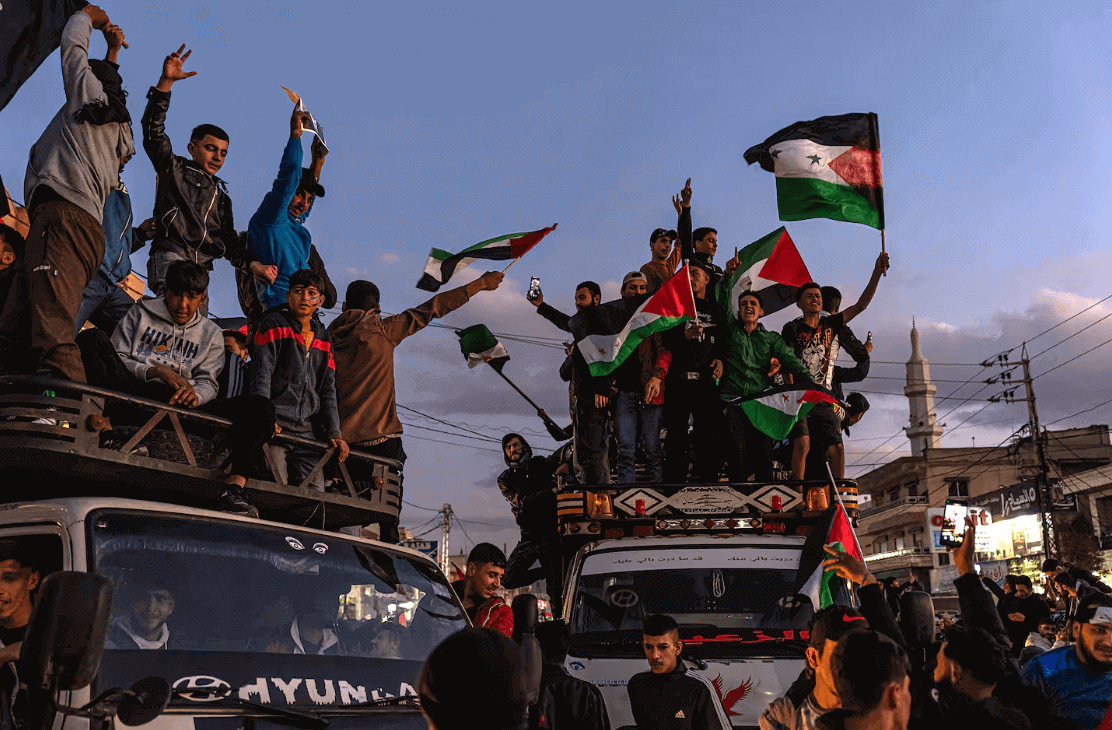被推翻的叙利亚领导人巴沙尔·阿萨德已抵达莫斯科并获得庇护

【中美创新时报2024 年 12 月 8 日编译讯】(记者温友平编译)据俄罗斯媒体报道,被罢免的叙利亚总统巴沙尔·阿萨德于周日逃往莫斯科,几个小时前,叛军令人震惊的推进占领了首都大马士革,结束了阿萨德家族 50 年的铁腕统治。美联社记者Abdulrahman Shaheen 和 Abby Sewell 对此作了下述详细报道。
俄罗斯通讯社塔斯社和俄罗斯新闻社援引一位未透露姓名的克里姆林宫消息人士的话称,阿萨德及其家人已在莫斯科获得庇护,莫斯科是他的长期盟友和保护者。美联社未能立即核实这些报道,但联系了克里姆林宫征求意见。
俄新社还称,莫斯科已收到叙利亚叛乱分子保证俄罗斯在叙利亚的军事基地和外交机构的安全。
据报道,阿萨德周日早些时候离开了叙利亚,在叛军猛烈进攻首都、结束阿萨德家族 50 年铁腕统治后,叙利亚人纷纷涌上街头,枪声不断。
迅速发展的事件引发了人们对该国和整个地区未来的质疑。俄罗斯常驻联合国第一副代表德米特里·波利安斯基在 Telegram 上发帖称,俄罗斯已要求联合国安理会召开紧急会议讨论叙利亚局势。
欢乐的人群聚集在大马士革的广场上,挥舞着叙利亚革命旗帜,这些场景让人回想起阿拉伯之春起义初期的情景,在残酷的镇压和叛乱的兴起使该国陷入近 14 年的内战之前。
在阿萨德和其他高级官员消失后,其他人则兴高采烈地洗劫了总统府和住所。
阿布·穆罕默德·戈拉尼曾是基地组织的指挥官,多年前他与该组织断绝关系,并表示他拥护多元化和宗教宽容,他领导着最大的反叛派别,并准备规划该国的未来。
这是自战士周六进入大马士革郊区以来,戈拉尼首次公开露面,他参观了庞大的伍麦叶清真寺,并称阿萨德的倒台是“伊斯兰国家的胜利”。他用自己的本名艾哈迈德·沙雷(而不是化名)自称,他告诉数百人,阿萨德把叙利亚变成了“伊朗贪婪的农场”。
反叛分子面临着一项艰巨的任务,即弥合这个饱受战争蹂躏、武装派别仍然四分五裂的国家的严重分歧。土耳其支持的反对派武装分子正在北部与美国盟友库尔德武装交战,伊斯兰国组织仍在一些偏远地区活动。
叙利亚国家电视台周日凌晨播出了叛军的声明,称阿萨德已被推翻,所有囚犯都已获释。他们呼吁人们维护“自由叙利亚国家”的制度。叛军随后宣布大马士革从下午 4 点到凌晨 5 点实行宵禁。
叛军称,他们释放了臭名昭著的赛德纳亚监狱的囚犯,人权组织称数千人在那里遭受酷刑和杀害。网上流传的一段视频显示,叛军砸开牢房门,释放了数十名女囚犯,其中许多人看起来很震惊。其中至少有一个小孩。
“直到我能看到儿子出狱并知道他在哪里,这份幸福才会圆满,”一位亲戚巴萨姆·马斯尔 (Bassam Masr) 说。“我已经找了他两个小时了。他已被拘留 13 年。”
叛军指挥官阿纳斯·萨尔哈迪 (Anas Salkhadi) 随后出现在国家电视台上,试图安抚叙利亚的宗教和少数民族,他说:“叙利亚是属于所有人的,没有例外。叙利亚属于德鲁兹派、逊尼派、阿拉维派和所有教派。”
“我们不会像阿萨德家族那样对待人们,”他补充道。
首都的庆祝活动
大马士革居民在清真寺祈祷,在广场上庆祝,高呼“真主伟大”。人们高呼反阿萨德口号,鸣响汽车喇叭。十几岁的男孩捡起安全部队丢弃的武器,向空中射击。
狂欢者挤满了国防部所在的伍麦叶广场。一些人挥舞着叙利亚三颗星的国旗,这面国旗在阿萨德政府之前就已存在,后来被革命者采用。在其他地方,首都的许多地方都空无一人,商店都关门了。
士兵和警察离开岗位逃跑,抢劫者闯入国防部。视频显示,一些家庭在总统府徘徊,有些人拿着成堆的盘子和其他家居用品。
“这就像一场梦。我需要有人叫醒我,”反对派战士阿布·莱斯说,并补充说,叛军在大马士革受到了“热情”的欢迎。
在司法部,叛军站岗,法官 Khitam Haddad 表示,他们正在保护文件免受混乱的影响。在外面,一些居民在寻找有关在阿萨德统治下失踪的亲属的信息。
一名只透露自己名字的女子 Heba 表示,叛军“感受到了人民的痛苦”。她担心叛军可能会报复性杀人,其中许多人似乎都是未成年人。
叙利亚的《祖国报》历来支持政府,它写道:“我们正面临叙利亚的新篇章。我们感谢上帝没有流更多的血。”它补充说,媒体工作者不应因发表过去的政府声明而受到指责,称其“只是执行了指示”。
阿拉维派是阿萨德的核心阵营,该派发表声明呼吁叙利亚年轻人“保持冷静、理性和谨慎,不要被卷入破坏我们国家团结的事件中。”
叛军主要来自叙利亚的逊尼派穆斯林占多数的地区,该地区还有相当数量的德鲁兹派、基督教徒和库尔德人社区。在东北部的卡米什利,一名库尔德人用鞋子猛击已故领导人哈菲兹·阿萨德的雕像。
叙利亚总理穆罕默德·加齐·贾拉利表示,政府已准备好“向反对派伸出援手”,将其职能移交给过渡政府。叙利亚反对派媒体分享的一段视频显示,武装人员于周日护送他从办公室到四季酒店。
安瓦尔·加尔加什表示,阿萨德此时的去向是“历史的注脚”,他将其与第一次世界大战后德国皇帝威廉二世的长期流亡相提并论。
呼吁有序过渡
自 11 月 27 日以来,叛军的进攻是近年来规模最大的一次,随着叙利亚军队的溃败,阿勒颇、哈马和霍姆斯等城市在几天内沦陷。俄罗斯、伊朗和黎巴嫩真主党武装组织在整个起义期间都为阿萨德提供了至关重要的支持,但在陷入其他冲突后,它们抛弃了他。
阿萨德统治的结束对伊朗及其盟友来说是一个重大打击,它们已经因与以色列的冲突而变得虚弱。伊朗在整个内战期间都强烈支持阿萨德,它表示叙利亚人应该“在没有破坏性、胁迫性、外国干预的情况下”决定自己的未来。伊朗驻大马士革大使馆显然已被遗弃,随后遭到洗劫。
与此同时,以色列总理本杰明·内塔尼亚胡表示,以色列军队占领了 1974 年在戈兰高地建立的缓冲区,称这是为了在叙利亚军队放弃阵地后保护以色列居民。以色列军方后来警告叙利亚南部五个社区的居民留在家中以确保安全,并且没有回答任何问题。
以色列在 1967 年中东战争中占领了戈兰高地,后来将其吞并。除美国外,国际社会都认为叙利亚被占领,阿拉伯联盟周日谴责以色列试图利用阿萨德垮台的机会占领更多领土。
叛军由“解放叙利亚”组织(HTS)领导,该组织起源于基地组织,被美国和联合国视为恐怖组织。戈拉尼试图将该组织重塑为温和、宽容的力量。
“戈拉尼创造了历史,给数百万叙利亚人带来了希望,”国际危机组织高级顾问达琳·哈利法说。“但他和叛军现在面临着艰巨的挑战。”
联合国叙利亚问题特使盖尔·佩德森周六呼吁在日内瓦举行紧急会谈,以确保“有序的政治过渡”。
海湾国家卡塔尔是该地区的主要调解人,周六晚间,卡塔尔主持了一场紧急会议,与会者包括八个在叙利亚有利益的国家的外交部长和高级官员。这些国家包括伊朗、沙特阿拉伯、俄罗斯和土耳其。
卡塔尔外交部发言人马吉德·安萨里表示,他们一致认为有必要“与当地各方接触”,包括哈姆扎政权,主要关切是“稳定和安全过渡”。
塞维尔在贝鲁特报道。美联社记者 Bassem Mroue、Sarah El Deeb 和 Kareem Chehayeb 在贝鲁特;Samar Kassaballi、Omar Sanadiki 和 Ghaith Alsayed 在大马士革;Jon Gambrell 在巴林麦纳麦;Josef Federman 在卡塔尔多哈;Tia Goldenberg 在耶路撒冷对本文亦有贡献。
题图:12 月 8 日星期日,人们在前往黎巴嫩叙利亚马斯纳边境口岸的交通堵塞中挥舞叙利亚国旗庆祝。DANIEL BEREHULAK/NYT
附原英文报道:
Russian state news agencies say ousted Syrian leader Bashar Assad is in Moscow and given asylum
By Abdulrahman Shaheen and Abby Sewell The Associated Press,Updated December 8, 2024
People celebrate while waving Syrian flags while stuck in traffic leading up to the Lebanon Syria Maasna border crossing in Bar Elias, Lebanon, Sunday, Dec. 8.DANIEL BEREHULAK/NYT
DAMASCUS, Syria (AP) — Ousted Syrian President Bashar Assad fled to Moscow on Sunday, Russian media reported, hours after a stunning rebel advance took over the capital of Damascus and ended the Assad family’s 50 years of iron rule.
The Russian agencies, Tass and RIA, cited an unidentified Kremlin source on Assad and his family being given asylum in Moscow, his longtime ally and protector. The Associated Press was not immediately able to verify the reports but contacted the Kremlin for comment.
RIA also said Moscow had received guarantees from Syrian insurgents of the security of Russian military bases and diplomatic posts in Syria.
Assad reportedly left Syria early Sunday, and Syrians have been pouring into streets echoing with celebratory gunfire after a stunning rebel advance reached the capital, ending the Assad family’s 50 years of iron rule.
The swiftly moving events have raised questions about the future of the country and the wider region. Russia has requested an emergency session of the U.N. Security Council discuss the situation in Syria, Russia’s first deputy permanent representative to the U.N., Dmitry Polyansky, posted on Telegram.
Joyful crowds gathered in squares in Damascus, waving the Syrian revolutionary flag in scenes that recalled the early days of the Arab Spring uprising, before a brutal crackdown and the rise of an insurgency plunged the country into a nearly 14-year civil war.
Others gleefully ransacked the presidential palace and residence after Assad and other top officials vanished.
Abu Mohammed al-Golani, a former al-Qaida commander who cut ties with the group years ago and says he embraces pluralism and religious tolerance, leads the biggest rebel faction and is poised to chart the country’s future.
In his first public appearance since fighters entered the Damascus suburbs Saturday, al-Golani visited the sprawling Umayyad Mosque and called Assad’s fall “a victory to the Islamic nation.” Calling himself by his given name, Ahmad al-Sharaa, and not his nom de guerre, he told hundreds of people that Assad had made Syria “a farm for Iran’s greed.”
The rebels face the daunting task of healing bitter divisions in a country ravaged by war and still split among armed factions. Turkey-backed opposition fighters are battling U.S.-allied Kurdish forces in the north, and the Islamic State group is still active in some remote areas.
Syrian state television broadcast a rebel statement early Sunday saying Assad had been overthrown and all prisoners had been released. They called on people to preserve the institutions of “the free Syrian state.” The rebels later announced a curfew in Damascus from 4 p.m. to 5 a.m.
The rebels said they freed people held at the notorious Saydnaya prison, where rights groups say thousands were tortured and killed. A video circulating online purported to show rebels breaking open cell doors and freeing dozens of female prisoners, many of whom appeared shocked. At least one small child was seen among them.
“This happiness will not be completed until I can see my son out of prison and know where is he,” said one relative, Bassam Masr. “I have been searching for him for two hours. He has been detained for 13 years.”
Rebel commander Anas Salkhadi later appeared on state TV and sought to reassure Syria’s religious and ethnic minorities, saying: “Syria is for everyone, no exceptions. Syria is for Druze, Sunnis, Alawites, and all sects.”
“We will not deal with people the way the Assad family did,” he added.
Celebrations in the capital
Damascus residents prayed in mosques and celebrated in squares, calling, “God is great.” People chanted anti-Assad slogans and honked car horns. Teenage boys picked up weapons apparently discarded by security forces and fired into the air.
Revelers filled Umayyad Square, where the Defense Ministry is located. Some waved the three-starred Syrian flag that predates the Assad government and was adopted by the revolutionaries. Elsewhere, many parts of the capital were empty and shops were closed.
Soldiers and police left their posts and fled, and looters broke into the Defense Ministry. Videos showed families wandering the presidential palace, some carrying stacks of plates and other household items.
“It’s like a dream. I need someone to wake me up,” said opposition fighter Abu Laith, adding the rebels were welcomed in Damascus with “love.”
At the Justice Ministry, where rebels stood guard, Judge Khitam Haddad said they were protecting documents from the chaos. Outside, some residents sought information about relatives who disappeared under Assad.
The rebels “have felt the pain of the people,” said one woman, giving only her first name, Heba. She worried about possible revenge killings by the rebels, many of whom appeared to be underage.
Syria’s al-Watan newspaper, which was historically pro-government, wrote: “We are facing a new page for Syria. We thank God for not shedding more blood.” It added that media workers should not be blamed for publishing past government statements, saying it “only carried out the instructions.”
A statement from the Alawite sect that has formed the core of Assad’s base called on young Syrians to be “calm, rational and prudent and not to be dragged into what tears apart the unity of our country.”
The rebels mainly come from the Sunni Muslim majority in Syria, which also has sizable Druze, Christian and Kurdish communities. In Qamishli in the northeast, a Kurdish man slapped a statue of the late leader Hafez Assad with his shoe.
Syrian Prime Minister Mohammed Ghazi Jalali said the government was ready to “extend its hand” to the opposition and turn its functions over to a transitional government. A video shared on Syrian opposition media showed armed men escorting him from his office and to the Four Seasons hotel on Sunday.
Anwar Gargash said Assad’s destination at this point is a “footnote in history,” comparing it to the long exile of German Kaiser Wilhelm II after World War I.
Calls for an orderly transition
The rebel advances since Nov. 27 were the largest in recent years, and saw the cities of Aleppo, Hama and Homs fall within days as the Syrian army melted away. Russia, Iran and Lebanon’s Hezbollah militant group, which provided crucial support to Assad throughout the uprising, abandoned him as they reeled from other conflicts.
The end of Assad’s rule was a major blow to Iran and its allies, already weakened by conflict with Israel. Iran, which had strongly backed him throughout the civil war, said Syrians should decide their future “without destructive, coercive, foreign intervention.” The Iranian Embassy in Damascus was ransacked after apparently having been abandoned.
Prime Minister Benjamin Netanyahu meanwhile said Israeli troops had seized a buffer zone in the Golan Heights established in 1974, saying it was to protect Israeli residents after Syrian troops abandoned positions. Israel’s military later warned residents of five southern Syria communities to stay home for their safety, and didn’t respond to questions.
Israel captured the Golan in the 1967 Mideast war and later annexed it. The international community, except for the United States, views it as occupied, and the Arab League on Sunday condemned what it called Israel’s efforts to take advantage of Assad’s downfall occupy more territory.
The rebels are led by the Hayat Tahrir al-Sham group, or HTS, which has its origins in al-Qaida and is considered a terrorist organization by the United States and the United Nations. Al-Golani, has sought to recast the group as a moderate and tolerant force.
“Golani has made history and sparked hope among millions of Syrians,” said Dareen Khalifa, a senior adviser with the International Crisis Group. “But he and the rebels now face a formidable challenge ahead.”
The U.N.’s special envoy for Syria, Geir Pedersen, called Saturday for urgent talks in Geneva to ensure an “orderly political transition.”
The Gulf nation of Qatar, a key regional mediator, hosted an emergency meeting of foreign ministers and top officials from eight countries with interests in Syria late Saturday. They included Iran, Saudi Arabia, Russia and Turkey.
Majed al-Ansari, Qatar’s Foreign Ministry spokesman, said they agreed on the need “to engage all parties on the ground,” including the HTS, and that the main concern is “stability and safe transition.”
Sewell reported from Beirut. Associated Press writers Bassem Mroue, Sarah El Deeb and Kareem Chehayeb in Beirut; Samar Kassaballi, Omar Sanadiki and Ghaith Alsayed in Damascus; Jon Gambrell in Manama, Bahrain; Josef Federman in Doha, Qatar; and Tia Goldenberg in Jerusalem, contributed.

